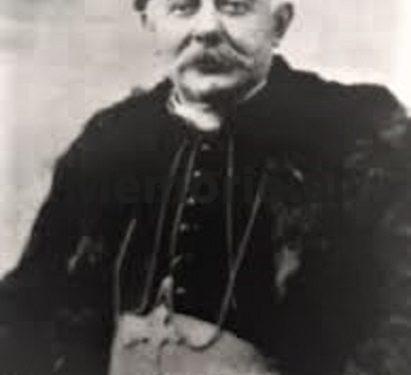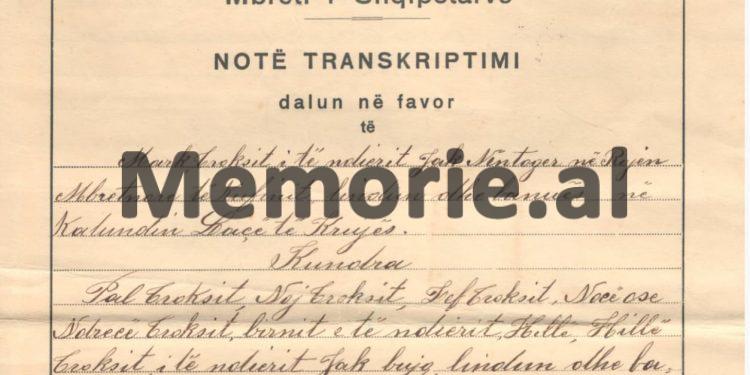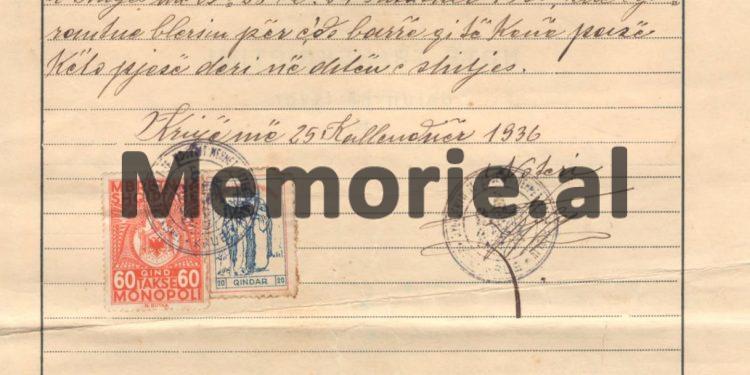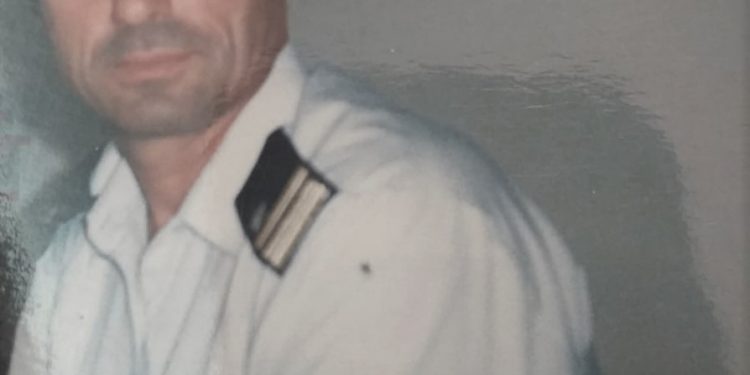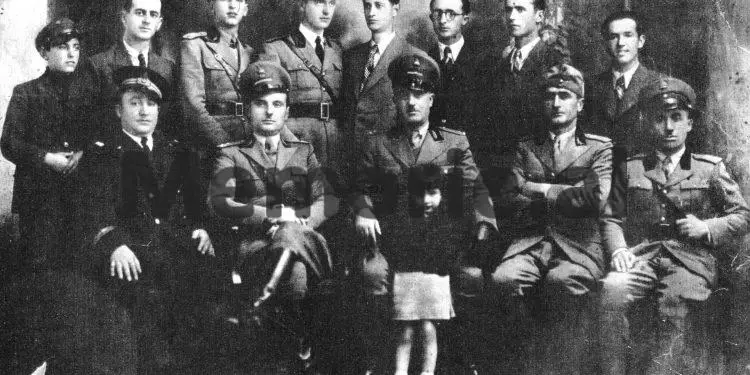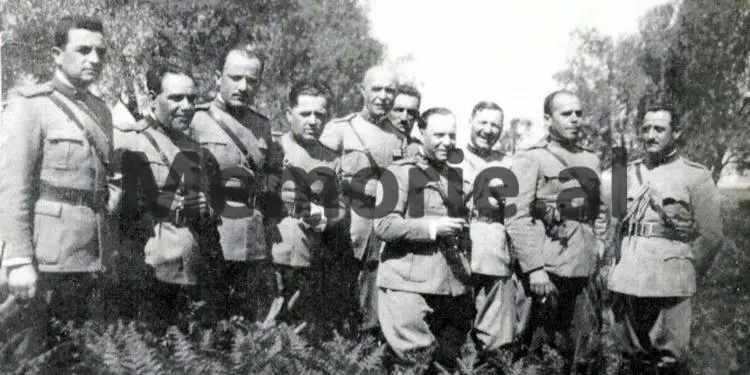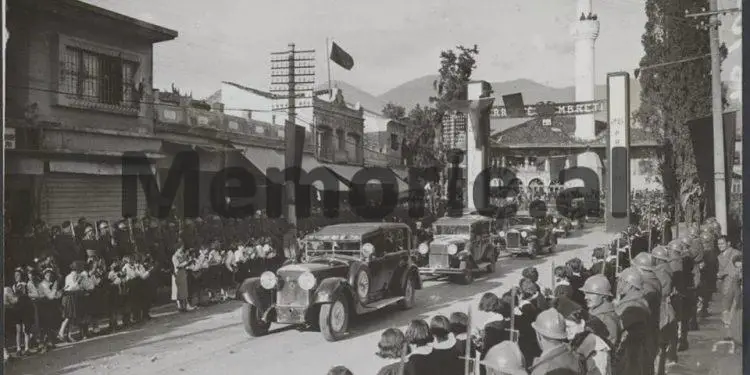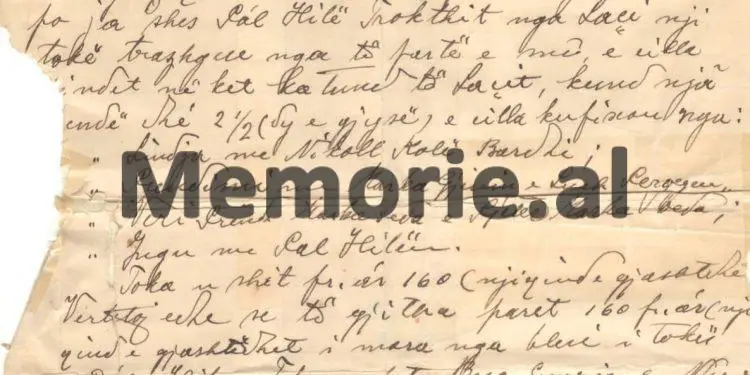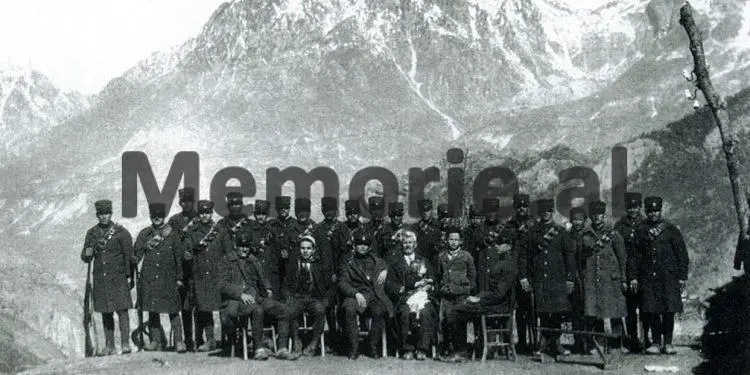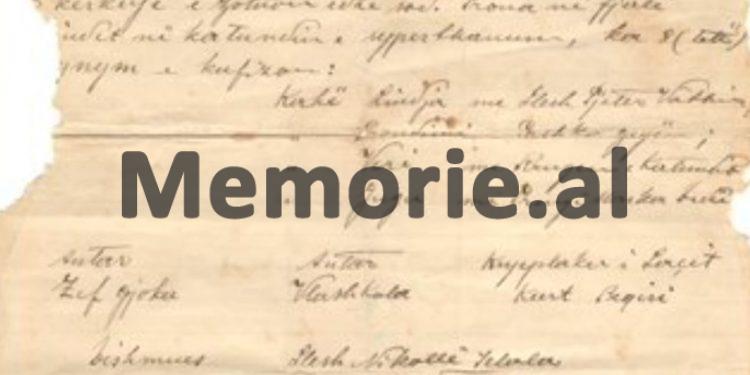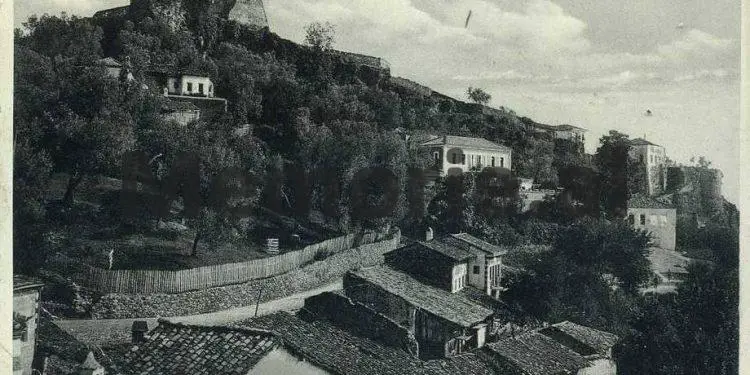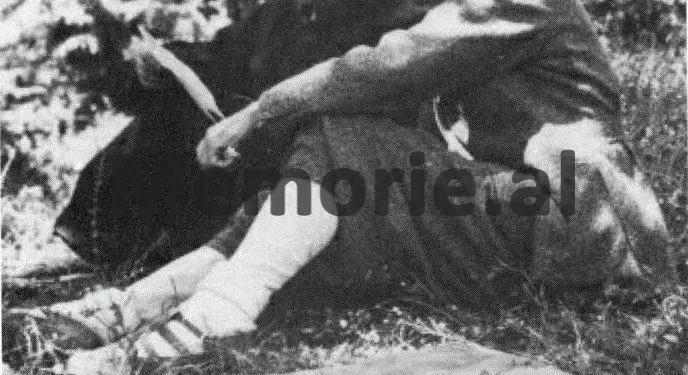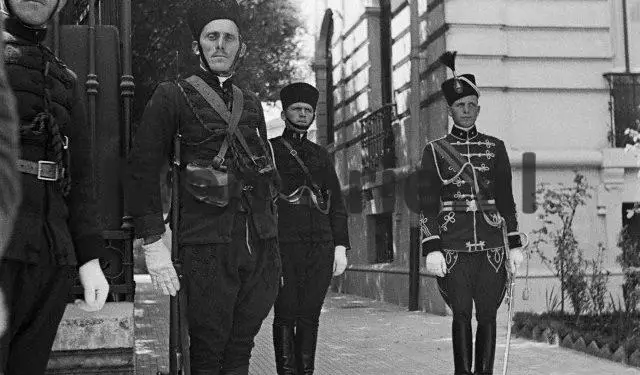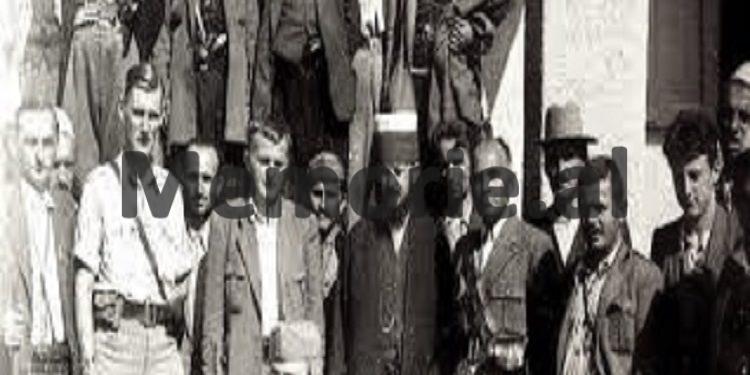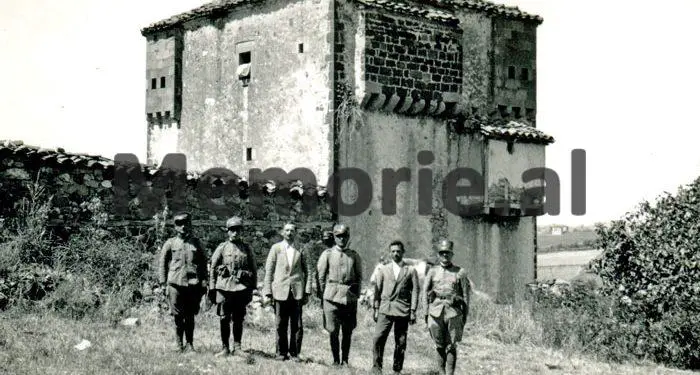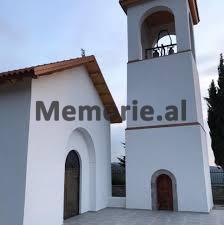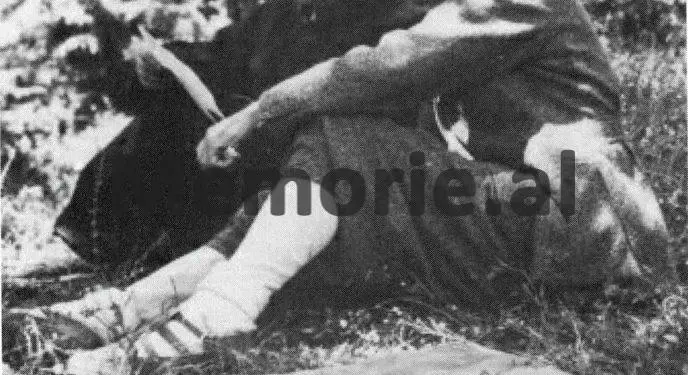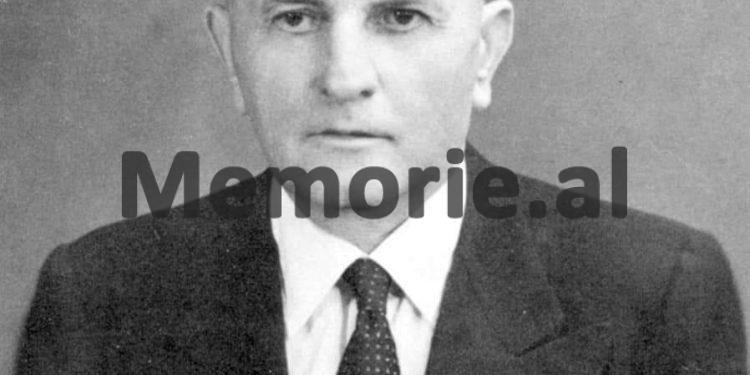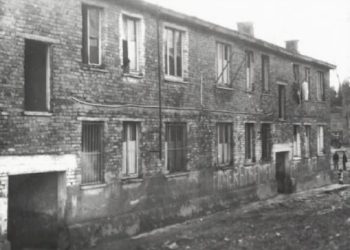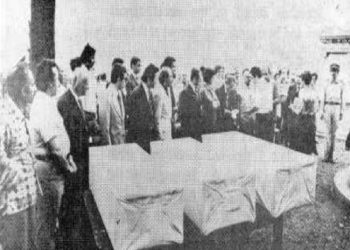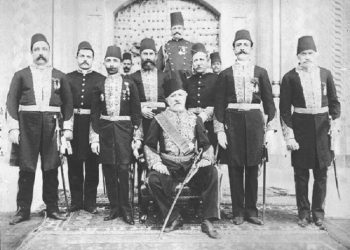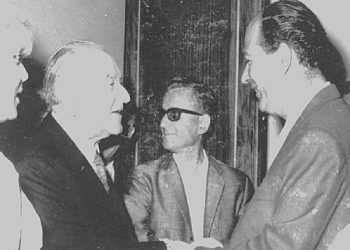Dashnor Kaloçi
Memorie.al publishes the unknown story of Mark Trokthi from Laçi i Kurbinit, descendant of one of the most famous families of that area for patriotic and religious traditions, where their first, Monsignor Pashko Trokthi, reached the highest levels of the church hierarchy , Serving for many years as Archbishop of Skopje and he is second on the list of religious personalities, who on June 29, 1895, in the Metropolitan Cathedral Church of Shkodra, signed the Third Albanian Council, under the leadership of Monsignor Pashko Guerin. Mark Trokth’s long military career from 1918, when he was mobilized as a soldier in the National Guard in Tirana, until the period of the Zog Monarchy, where he, after serving in various positions, mainly in the units of the Border Guard in Shkodra, Kukës, Saranda, etc., managing to obtain the rank of captain and be decorated by King Zog with the “Medal of Bravery”, in April 1939, left Albania and settled as a political asylum in Yugoslavia, after he had openly opposed the Italian occupation of the country. The rejection of the offer made by the Prime Minister Mustafa Kruja, that Captain Trokthi return to Albania and serve in the Albanian National Army with the rank of colonel, which caused the government of that time to order the deportation of his family. his and the burning of the homes of the Trokthi family. Mark’s return to Albania with Abaz Kupi and British Major Cripps, in July 1941 and his assassination by Italian forces in the village of Moll-Kuç i Ishm, where he was part of Abaz Kupi’s forces, as well as the vicissitudes of his proclamation of ‘Martyr of the Fatherland’, during the communist regime, even though he was the first martyr.
The early origin of the Trokthi family is from the village of Mërqinë in the area of Ishm, located on the western side of Fush-Krujë, where the Troksi tribe still lives, from whose trunk the Trokthi, who settled in Laç i Kurbinit, are separated circa 1859. After the family of Llesh Pjetër Vathi, the Trokthi tribe is known as one of the first and oldest houses of Kurbin, the province which lies between two rivers, Mat and Droi. The Trokthi are better known as families engaged in agriculture and livestock, but also as closely related to religion, starting from Pashko Trokthi, who reached the highest levels of the religious hierarchy, to the Archbishop of Skopje, who together with his brother Hila, constitute the first generation of the Trokthi family. According to some archival documents available to the Trokthi family in Laç i Kurbinit, the greatest activity and activity as a patriot and religious hierarch, Monsignor Pashku had in the city of Skopje, extending it to Prizren and Gjakova, where together with the well-known teacher and patriot, Mati Logoreci, opened and defended the first Albanian school in Prizren. According to the scholar from Shkodra, Gjush Sheldia (“Church History”), Monsignor Pashko Trokthi is the second in the list of religious personalities, who on 29.VI.1895 in the Metropolitan Cathedral Church of Shkodra, signed the Third Albanian Council under the leadership of Monsignor Pashko Guerin. According to some other testimonies, it is known that around 1898, Archbishop Trokthi was summoned to the Vatican and there was much discussion by the Pope of that time, to give him the title of Cardinal, but this was not done for reasons that he died poisoned under unclear circumstances and was later buried in the religious cemetery of the Vatican (Church of St. Peter), where his remains are still buried today.
Who was Mark Trokthi?
After Monsignor Pashkos, one of the most famous names of the Trokthi family of Laçi i Kurbinit, is his nephew Mark Jak Trokthi, also known as Captain Marka Jaku. Mark was born in the village of Laç on April 2, 1899 and he received his first lessons in his native village, under the tutelage of the parish priest of the Church of “St. Michael” Pader Klement Miraj and later he graduated from the school “Normale Of Elbasan. After graduating from that school, he returned to his hometown of Laç, where he remained until 1918, when he was mobilized as a soldier in the National Guard in Tirana. During his service in the National Guard, for the skills and talents he showed, he was awarded the rank of sergeant. After his release from the army, Mark returned to his family in his hometown, but he did not stay long, as he was called back to serve in the Army, as a career officer. In 1921 Marku completed the course of officers in Tirana, which took place under the auspices of the Ministry of War of that time from where he received the rank of Postgraduate. After that, he completed several short specialization courses for officers, both in Tirana and in Italy. After completing these courses, he was appointed commander of the Machine Gun Company in the National Guard Regiment in Tirana, where he distinguished himself as a highly trained soldier, which soon earned him the rank of lieutenant. In this specialized unit, Marku served until 1929, when the Ministry of War decided to transfer him to the northern borders of Albania?
Commander of the North Frontier and decorated by King Zog
Seeing Mark’s high military training, in September 1929, the Ministry of War appointed him to serve as commander of the border post at Rapsh i Hani i Hotit, in the Great Highlands. After serving for a year at that border post, in 1930 Mark was transferred again, sending him to the Southern border of Albania, to Konispol in Saranda, where he remained until 1933. The reasons for this transfer were the smuggling of cigarettes that performed in that border area, and Mark was sent there as a military man with a clear moral character and uncorrupted. After serving for several months there, stopping the smuggling, in the same year, by order of the Commander-in-Chief, General Xhemal Aranitasi and the firm of King Zog, Lieutenant Marka Jaku was transferred back to Vermosh, in the Bordolec Pass, where he served as a post commander, until 1934, when he was transferred again to Morina in Kukes and then to Borje in Shishtavec. After all these transfers, where he was sent by the General Command of the Army to stabilize the unstable situations on the northern borders of Albania, in 1937, Mark was transferred again to Vermosh in the Great Highlands. For his extraordinary contribution to the responsible performance of the duties assigned to the protection of state borders, at the suggestion of General Xhemal Aranitasi, King Zog decorated Lieutenant Mark Trokth, with the ‘High Order of Bravery’ and shortly thereafter, ‘ was also awarded the rank of captain, receiving personal congratulations from King Zog, who appointed him commander of the Cavalry, at the Royal Guard in Tirana. During the period that Mark served as a military man of the Monarchy, he enjoyed great authority throughout the Kurbin area, as thanks to his satisfactory economic situation, he occasionally did various charities, in the poor houses of that area.
On April 7, ‘39, he calls for resistance
In the spring of 1939, seeing the difficult situation that was approaching the country, Captain Trokthi was transferred again from Tirana to the northern border in Bajza of Kastrati of Malësia e Madhe, where he found him and April 7, ’39, where Benito Mussolini’s fascist Italy undertook military aggression against Albania. At this time, Captain Trokthi called on all the population of the border area he covered militarily to organize them to put up an armed resistance to the Italian forces. In this call, Marku also found the support of the reservist officer (Kreshnik) Prek Cali, as well as the senior officer, Major Llesh Marashi. After April 7, 1939, knowing that the Italian fascists would take measures against him to imprison him, he left for Yugoslavia, along with many of the senior military personnel of the Kingdom of Albania and other leading personalities who openly opposed the occupation of the country or organized the resistance against the Italian troops, such as: Major Abaz Kupi, Major Spiro Mojsiu, Padër Lek Luli etc. In the city of Valjevo in Yugoslavia, where many of the senior military men of the Kingdom of Albania settled, Captain Mark Trokthi was also treated as a political emigrant by the royal government of that time. But during that period of stay in Yugoslavia, Marku took refuge more in the houses of his uncle’s friends, Dom Pashko Trokthit, in Prizren and the Gjakova Highlands. During the years 1939 – 1941 that Marku was in Yugoslavia, he had various offers until the Prime Minister Mustafa Merlika Kruja, who called him several times to come to Albania and take senior military positions in the service of that government. That call was answered by many of the military of the Monarchy, who returned home to take on the tasks assigned to them, while Mark categorically refused. For the last time, Prime Minister Merlika sent to Mark his father-in-law, Lazër Gjoka from Milot, (who in 1912, was with Gjin Pjetër Previzi when they raised the flag in Milot), promising him that: if he returned to Albania would give him the rank of colonel and senior leadership positions in the National Army. After this offer, Marku responded to Prime Minister Merlika with a letter, where among other things he wrote: “Thank you for the request you sent me. I will return to Albania if I am alive, together with my friends, “When Albania is all Albanian and without invaders and their servants. I will do this not for the high offices and duties that you promise me in your government, but for an Albania of Albanians.” After this response, the government of Mustafa Kruja decided to burn Mark’s house in the village of Laç i Kurbinit and deport the whole family. After the whole large Trokthi family stayed out of the house for three days, its burning was not possible, thanks to the intervention of Padre Klement Miraj, who personally went to the Minister of Internal Affairs, Kol Bibë Mirakaj, informed him of the great patriotic activity of Monsignor Pashko Trokth. After that, Minister Miraka suspended the decision to deport the Trokthi family.
Mark’s return to Albania in 1941 with Major Abaz Kupin
After staying in Yugoslavia for almost two years, as a political emigrant, in July 1941, Captain Mark Trokthi returned illegally to Albania, describing the itinerary: Dibër, Mat, Daul, Vinnjoll, Luga-Paq and settled in Larushk of Fushë- Kruja, sheltered by the Vathi family. His return to Albania is also confirmed by a document of the Ministry of Internal Affairs of that time, which informs the Albanian Prime Minister, where among other things it is said: “We inform you that Major Abaz Kupi, Isuf Selmani and Captain Mark Trokthi, accompanied by the English colonel Cripps, have returned to Albania “. (AQSH p.552 / 2 D.171. Year 1941). A few months after his return to Albania, Captain Trokthi settled next to his old friend Major Kupi, who at that time had under his command close to 800 armed forces, concentrated in the villages of Kruja and Tirana. Marku immediately joined Abaz Kupi’s military formations and as a result, Mustafa Merlika’s government declared the man wanted for his anti-fascist activity, which dates back to April 7, 1939, when he objected open the invasion calling for armed resistance to the invading Italian troops.
The murder of Mark and his comrades by the Italians in Ishëm
In this context and based on the decision of the government which was assigned to the Ministry of Internal Affairs, on April 6, 1942, the Italian forces, having previously dictated the houses and villages where he was sheltered, organized an operation, from where they made his siege possible, in the village of Moll-Kuç i Ishm. After being informed that they were surrounded by the observer they had left outside the house, Captain Mark Trokthi, who was also the leader of that small group in the forces of Abaz Kupi, called on the people under his command to leave. Immediately from there, so that the owner of the house had no consequences from the Italian authorities. Mark came out first from the house where they were sheltered and the moment they were crossing the wire bridge (catwalk) over the river Ishëm, they were suddenly found under the barrage of fire of the Italian forces, who had made the complete siege. In this very short attempt, Marku was killed first and then the bullets caught his two friends Xhemal Dervishi, Hajdar Meta. Later, the Italian forces captured alive and four other comrades of Mark, who were then brought before a military court and after being sentenced to death, hanged in the middle of Kruja. After their murder, according to the order from Tirana, the three corpses were loaded into a cart and exposed for three days in the Kruja Castle. The fourth who was captured alive, Xhemal Danin (from Picrraka in Kruja), was sent to Italy by the Italians, where he was hanged. From various testimonies, it is said that when Major Abaz Kupi received the news of the murder of Captain Mark Trokthi and two of his comrades, he said: “It would have been better if one of my sons had been killed than Mark Trokthi”.
Consequences of the Trokthi family, after Mark’s murder
According to the testimony of his nephew, the retired major, Preng Trokthi, (former senior military of the Ministry of Internal Affairs serving in the Republic Guard), although Captain Mark Trokthi was killed by Italian forces for his anti-fascist activity, after the end of the War, in the years of Enver Hoxha’s communist regime, he was not declared a ‘Martyr of the Fatherland’ because he was considered an accomplice of Abaz Kupi and his name was never mentioned in the press or in various commemorative activities. Despite this, his family in Laç i Kurbinit was looked at differently and it had consequences from time to time, to the extent that the local government sought to declare them as kulaks, due to the numerous properties and lands owned by the Trokthi tribe. , some of which had been purchased by Mark during his years in the Royal Guard. Despite the constant insistence of Moll Bajrami from Zheja, one of the most prominent communist exponents of the local government of the Kurbin area (whom Mark had kept close as his adjutant in the last years of the Monarchy), the proclamation was not possible. of Mark Trokthi, as a ‘Martyr of the Fatherland’, after the party authorities of Kruja, mentioned the saying of Abaz Kupi, “It would have been better if one of my sons had been killed than Mark Trokthi”. Very late, in the late ’60s, given the fact that Laçi i Kurbinit and the whole area (which included Laçi, Shullazi, Selita, Gjormi, Mamurrasi, Gorreja, Gurëzi, Fush-Kuqja, etc.), had no ‘Martyr of the Fatherland’ and no headstone where party and state organs paid homage and laid wreaths on the occasion of May 5, it became possible that Mark Trokthit, one of the first to have fought and was killed by the Italians were given the title “Martyr of the Fatherland”. At the same time, the 8-year school in the city of Laç was baptized in his name, and a few years later a monument was erected in his name. In this context, the biography of the Trokthi tribe was somewhat adjusted and the path of Captain Mark Trokthi as a military man was followed by his two nephews, Preng Trokthi, (after the ’90s he was with the rank of major) and Leonard Trokthi, who served in the ranks of the units of the Ministry of Defense, reaching the rank of lieutenant colonel. /Memorie.al




